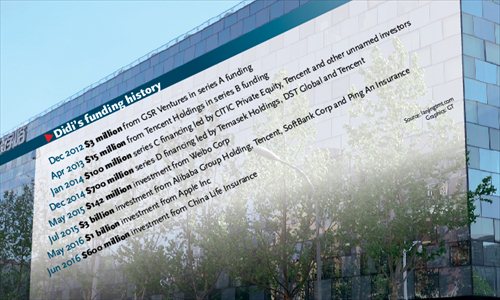
Didi's funding history
Ammunition for ride-hailing price war; more room to stop it
Chinese ride-hailing service giant Didi Chuxing (Didi) announced Monday it has received a strategic investment equivalent to some $600 million from China Life Insurance (China Life).
The cash infusion comes after a $1 billion investment by Apple Inc on May 13.
Experts said the investment gives more ammunition to Didi in its war with competitors such as US-based rival Uber over the Chinese mainland market. The arrangement also offers Didi the possibility to tap new income sources by serving the needs of vehicle owners, such as insurance.
The funding from China Life, the country's largest State-owned commercial insurance conglomerate by market value, includes an equity investment of $300 million, according to a statement Didi e-mailed to the Global Times Monday.
The two will cooperate on Internet-powered financial innovation and other initiatives, the statement said, noting that Didi's investors include Tencent Holdings, Alibaba Group Holding and Apple Inc, among others.
China Life runs a business spanning life insurance, property insurance and asset management.
Didi offers a wide range of mobile transportation services, including taxi hailing, private car hailing, ride hitching, chauffeur service, buses and test drive services to some 300 million users in China, the company said.
Zheng Chunhui, an industry analyst with Beijing-based market consultancy Sootoo, told the Global Times Monday that the structure of the investment deal indicates that some of the insurance services currently offered to Didi drivers and riders could go to the counter of China Life. In China, the driver and the rider are both covered by insurance policies during the hailing ride.
Li Chengdong, an independent e-commerce strategy analyst, told the Global Times Monday that the funding helps Didi replenish its financial resources so it can continue to offer subsidies.
Having big-name companies on its investors' list also helps its brand building, Li said.
Didi has about 99 percent of the market in taxi hailing in China and over 70 percent in private car hailing, according to a report by news portal caixin.com on Monday, citing a financing document used by Didi.
Transactions on the Didi platform stood at 34.7 billion yuan ($5.27 billion) in 2015, with a revenue of 2.6 billion yuan and a net loss of 12.2 billion yuan, the report said.
The company is also facing a growing threat from Uber, which is more aggressive in subsidizing drivers.
Uber announced a $3.5 billion investment from Saudi Arabia's Public Investment Fund on June 1. Its previous investors include Chinese search engine Baidu Inc.
Liu Zhen, senior vice president of Uber China, said on June 3 that Uber hopes to surpass its rival in the Chinese mainland in 2017.
Including subsidies, the two rivals are burning through about 1 billion yuan of cash per month, according to media reports.
Didi Chuxing President Liu Qing said in an interview with US-based financial channel CNBC on June 2 that a market leader does not necessarily need to buy market share. That burden usually falls on the smaller players, who have to spend heavily on subsidies.
However, on the Caixin website where the interview video clip was posted, feedback suggests otherwise.
Among the more than a dozen comments posted, several posts complained that it's more expensive nowadays to use Didi than Uber and that customers care the most about fares, since the service is about the same.
Wu Chenhui, an independent analyst, told the Global Times Monday that because the technical barriers to providing car-hailing services are not that tough to surmount, companies have to continually subsidize customers.
Zheng, from Sootoo, pointed out that drivers' loyalty is as important as that of customers. Both are recipients of the company's subsidies.
"Didi, which seems to look after the interests of drivers better than users, is forming up a base of customers who directly or indirectly own a car. These cars needs insurance, maintenance and repairs, and this user base could become a market that the firm can tap," Zheng said.
If revenue could really be tapped from channels other than its main business, then Didi will be in a better position financially and it can withdraw from the "subsidy war" with honor, Zheng noted.
"If Didi can keep its market share at the current level, then it can start some business focusing on drivers, who own cars and usually have a fatter wallet purse than the average person," Zheng concluded.


















































